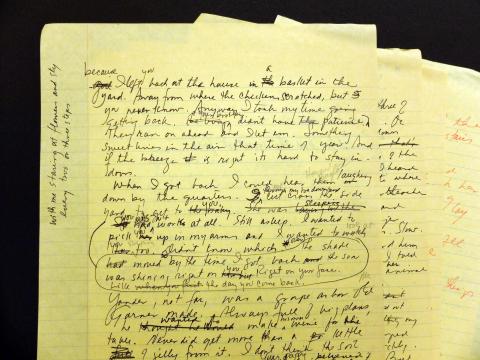Toni Morrison Papers Open for Research

Beloved early draft Toni Morrison Papers (C1491) Princeton University Library
The Princeton University Library is pleased to announce that the major portion of the Toni Morrison Papers (C1491), part of the Library’s permanent collections since 2014, is now open for research. The papers are located in the Manuscripts Division, Department of Special Collections, in the Harvey S. Firestone Memorial Library. They contain more than two hundred linear feet of archival materials that document the life and work of Toni Morrison, Nobel Laureate in Literature (1993) and Robert F. Goheen Professor in the Humanities (Emeritus) at Princeton University. Morrison’s papers were gathered from multiple locations over more than two decades, beginning with the files recovered by the Library’s Preservation Office after the tragic fire that destroyed her home in 1993. Over the past eighteen months, the most significant of the papers have been organized, described, cataloged, and selectively digitized. The papers are described online in a finding aid.
Most important for campus-based and visiting researchers are some fifty linear feet of the author’s manuscripts, drafts, and proofs for the author’s novels The Bluest Eye (1970), Sula (1973), Tar Baby (1981), Beloved (1987), Jazz (1992), Paradise (1997), Love (2003), A Mercy (2008), Home (2012), and God Help the Child (2015). The only exception are materials for Song of Solomon (1977), which are believed lost. In the interest of preservation, by agreement with the author, all of these manuscripts have been digitized in the Library’s Digital Studio. Research access to digital images of Morrison’s manuscripts will be provided in the Special Collections Reading Room. The study of Morrison’s manuscripts illustrates her approach to the craft of writing and help trace the evolution of particular works, from early ideas and preliminary research, to handwritten drafts on legal-size yellow notepads, and finally corrected typescripts and proofs. The early drafts often differ substantially from the published book in wording and organization, and contain deleted passages and sections.
A single yellow notepad may contain a variety of materials, including content related to other works, drafts of letters, inserts for later typed and printed versions, and other unrelated notes. Corrected typescript and printout drafts often show significant revisions. Material from various stages of the publication process is present, including setting copies with copy-editor’s and typesetter’s marks, galleys, page proofs, folded-and-gathered pages (not yet bound), blueline proofs (“confirmation blues”), advance review copies (bound uncorrected proofs), and production/design material with page and dust-jacket samples. In addition to documenting Morrison’s working methods, the papers make it possible to see how books were marketed to the reading public and media, and also to trace the post-publication life of books, as they were translated, repackaged, reprinted, released as talking books, and adapted for film.
Among unexpected discoveries that came to light during archival processing are partial early manuscript drafts for The Bluest Eye and Beloved; and born-digital files on floppy disks, written using old word-processing software, including drafts of Beloved, previously thought to have been lost. Morrison also retained manuscripts and proofs for her plays Dreaming Emmett (1985) and Desdemona (2011); children’s books, in collaboration with her son Slade Morrison; short fiction; speeches, song lyrics; her opera libretto for Margaret Garner, with music by the American composer Richard Danielpour; lectures; and non-fiction writing.
Also valuable for researchers is Morrison’s literary and professional correspondence, approximately fifteen linear feet of material, including letters from Maya Angelou, Houston Baker, Toni Cade Bambara, Amiri Baraka, Gwendolyn Brooks, Ossie Davis and Ruby Dee, Leon Higginbotham, Randall Kennedy, Ishmael Reed, Alice Walker, and others. Additional literary correspondence is found in Morrison’s selected Random House editorial files, where her authors included James Baldwin, Toni Cade Bambara, Angela Davis, and Julius Lester. Morrison also retained drafts, proofs and publication files related to two works by Toni Cade Bambara, which Morrison posthumously edited for publication; as well as photocopies of selected correspondence of James Baldwin, 1957-1986, and materials relating to Baldwin’s literary estate.
The remaining Morrison Papers are being processed and will be made available for research gradually over the next year, with arrangement and description to be completed by spring 2017. These include her Princeton office files and teaching materials, fan mail, appointment books (sometimes called diaries), photographs, media, juvenilia, memorabilia, and press clippings. Complementing the papers are printed editions of Morrison’s novels and other published books; translations of her works into more than twenty foreign languages; and a selection of annotated books. Morrison’s additional manuscripts and papers will be added over time.
Beyond the Toni Morrison Papers, the Department of Special Collections holds other archival, printed, and visual materials about African American literature and history. The best files are in American publishing archives. For example, the Manuscripts Division holds the Harper & Brothers author files for Richard Wright’s books Uncle Tom’s Children (1938), Native Son (1940), Black Boy (1945), Outsider (1953), Black Power (1954), and Pagan Spain (1957); Charles Scribner’s Sons author files for Zora Neale Hurston, chiefly pertaining to her novel Seraph on the Suwanee (1948); and the Quarterly Review of Literature files of Ralph Ellison’s corrected typescripts and proofs for three extracts from early working drafts of his second, posthumously published novel Juneteenth (1999).
For information about the Toni Morrison Papers, please consult the online finding aid. For information about visiting the Department of Special Collections and using its holdings, please contact the Public Services staff at rbsc@princeton.edu
Newsletter
Subscribe to Princeton University Library’s e-newsletter for the latest updates on teaching and research support, collections, resources, and services.
